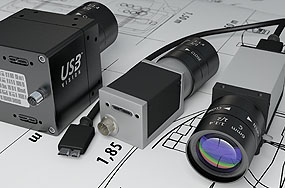Berlin, January 13th, 2015
A Close View on USB3 Vision™
Real-Time Image Capturing and Processing with USB3 Vision™

Kithara Software, innovator for industrial software solutions under Windows®, following the real-time support of USB 3.0, now also provides the machine vision standard USB3 Vision™ in real-time. Used in advanced fields such as robotics, mechanical engineering or medical engineering, this allows for image data from industrial cameras, to be reliably captured and processed with minimal reaction times.
With the real-time capability of USB3 Vision™, the Berlin-based software development company extends the »RealTime Suite« with the support of one of the newest and most cost-efficient machine vision standards.
”The introduction of the USB3 Vision™ standard stands as an example for the development towards a universal applicability of industrial cameras in almost every industrial sector. In the future, processes and segments will undergo increasingly extensive image capturing and evaluation procedures. This is especially relevant in the areas of manufacturing and quality assurance, for example in advanced industry solutions. In order to immediately respond to this overwhelming amount of image data, considering rising throughput time and quantity, machine vision and automation will have to work closely together. This in turn requires a single coherent real-time system”, Uwe Jesgarz, managing director of Kithara Software GmbH, summarized.
Defined by the AIA not until 2013, the USB3 Vision™ interface has enjoyed great market success due to its cost-efficient and standardized hardware, which ensures flexible exchangeability of varying camera models by different manufacturers. The generic programming interface GenICam™, already used for GigE Vision® and Camera Link®, also allows for access to vendor-specific features in addition to common camera functions. For advanced applications, the high bandwidth of USB3 Vision™ cameras enables the use of accordingly high resolutions and image transfer rates, while at the same time maintaining system stability with low CPU usage.
